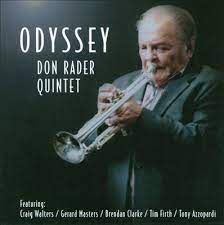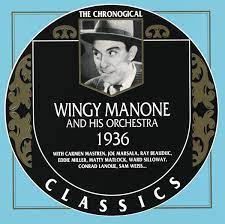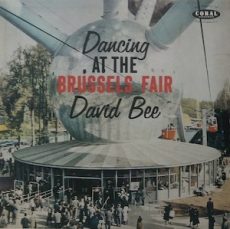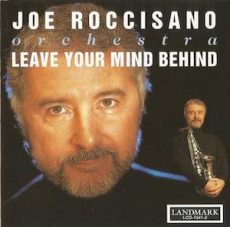
Daily Dose Of Jazz…
Donald Arthur Rader was born October 21, 1935 in Rochester, New York and began playing trumpet at age five, being taught by his father. He studied at Sam Houston State Teachers College before serving in the Navy in the 1950s as a member of the band.
At the end of the decade he played and arranged for Woody Herman into the Sixties, followed by Maynard Ferguson, Count Basie, Louie Bellson, Harry James, Terry Gibbs, Frank Foster, Henry Mancini, Les Brown from 1967 to 1972. Then he left Brown for the Stan Kenton Orchestra.
He toured with Della Reese, Sarah Vaughn, Andy Williams, Percy Faith, Diana Ross, Elvis Presley, Jerry Lewis and Bob Hope, both intermittently for 28 years with five tours of wartime Vietnam with the latter.
Assembling a quintet in Los Angeles, California in 1972 Don continued working with West Coast jazz musicians, including Lanny Morgan, Lew Tabackin, and Toshiko Akiyoshi. He recorded as a leader and worked in music education for many years, including in Australia in the 1980s.
He has recorded eight albums as a leader, and as a sideman three with Count Basie, and seven with Maynard Ferguson. Trumpeter Don Rader continues to perform at the age of 87.
More Posts: bandleader,history,instrumental,jazz,music,trumpet

Daily Dose Of Jazz…
Conrad Lanoue was born on October 18, 1908 in Cohoes, New York. He started on piano when he was ten years old and attended the Troy Conservatory.
Beginning his career in his 20s, he played piano at hotels in his hometown. Conrad recorded with Red McKenzie in 1935, and under the combined leadership of trumpeter Eddie Farley and trombonist Mike Riley in 1935–36. During the 1930s he worked for Louis Prima, then Wingy Manone from 1936 to 1940 followed by playing with pianist Joe Haymes.
From the 1940s to the 1960s, he was a member of bands led by Lester Lanin, Charles Peterson, and Hal Landsberry. He also wrote big band arrangements. Pianist and arranger Conrad Lanoue, who never recorded as a leader, retired in 1968 due to illness and transitioned in Albany, New York on October 15, 1972.

Daily Dose Of Jazz…
David Bee was born on October 17, 1903 in Brussels, Belgium. He was a multi-instrumentalist adept on clarinet, harp, piano, and alto and tenor saxophone. For a year in 1924 he played with the group Bistrouille ADO before co-founding an ensemble with Peter Packay called Red Beans. The group toured widely throughout western Europe.
After returning to Belgium, David joined Robert De Kers’s band, and also played in Paris, France at Chez Florencewith Benny Carter and Willie Lewis. He recorded with Gus Deloof in the early Forties and after World War II he played with Robert Bosmans and Chas Dolne later in the decade. He led his own bands and groups at various times in the 1950s and continued recording late into the decade and the 60s.
As a composer, Bee pennedr the tunes High Tension recorded by Luis Russell) and Obsession recorded by Ted Heath and Reg Owen.
Clarinetist, harpist, pianist, alto and tenor saxophonist, arranger and composer David Bee, also known as Ernest Craps, Ernie Sparks, and Manuel Travo, transitioned in 1992.
More Posts: arranger,clarinet,composer,harp,history,instrumental,jazz,music,saxophone

Daily Dose Of Jazz…
Anthony Kerr was born in Belfast, Northern Ireland on October 16, 1965. From 1981 till 1984 he received his education at the Belfast School of Music. Moving to New York City after graduating, he studied vibes and marimba with David Friedman and Kenny Werner. He won a scholarship to the New School of Jazz and Contemporary Music in 1987.
Returning to Ireland, Anthony went on to work as a percussionist with the RTE Symphony Orchestra. There was a period of time when he was employed with the UK’s National Theater.
Kerr later worked as a jazz musician with John Taylor, Louis Stewart, Peter King, Norma Winstone, Mike Westbrook, a bandleader he toured with around Europe. He worked with Charlie Watts and Georgie Fame, while simultaneously leading his own group and conducting jazz workshops in Belfast.
He toured with the Irish Youth Jazz Orchestra and worked with BBC Big Band and collaborated with Ian Shaw and a saxophonist Dale Barlow. He leads his own quartet and the Mallet Band with Justin Woodward, Stewe Brown and Geoff Gascoyne.
In 1994 Kerr was voted best instrumentalist at the British Jazz Awards and the following year received the Young Jazz Musician of the Year. He also won nominations in the Rising Star category in 1995, 1996 and 1998.
His first album “First Cry” was made in collaboration with singer / lyricist Jacqui Dankworth. His second album, “Now Hear This” which was recorded live at Ronnie Scott’s Club, was released in 1997.
Vibraphonist Anthony Kerr currently teaches vibraphone and jazz improvisation at the Royal College of Music in London, produces and records music from his home studio in Hertfordshire, England.
More Posts: bandleader,educator,history,instrumental,jazz,music,vibraphone

Daily Dose Of Jazz…
Joseph Lucian Roccisano was born on October 15, 1939 in Springfield, Massachusetts. He received his bachelor’s degree in music education from SUNY-Potsdam in 1963. In 1964 he played in the Tommy Dorsey orchestra under Sam Donahue.
After moving to Los Angeles, California in the mid-Sixties he played with Don Ellis, Ray Charles, Louie Bellson, Lew Tabackin, Toshiko Akiyoshi, Terry Gibbs, Don Menza, Bill Holman, and Don Rader. He assembled the 15-piece ensemble Rocbop in 1976 and played in the Capp-Pierce Juggernaut in 1981.
He formed his own big band, the Joe Roccisano Orchestra, releasing two albums during the 1990s. The musicians joining him in this band included Bill Charlap, Bud Burridge, Jack Stuckey, Franck Amsallem, James E. Pugh, John Basile, Ken Hitchcock, Lou Marini, Matt Finders, Robert Millikan, Scott Lee, Terry Clarke, Tim Ries, Tom Harrell, Scott Robinson, and Greg Gisbert.
He became an arranger for Ellis, Bellson, Doc Severinsen, and Woody Herman. He scored the tune Green Earrings on the 1978 Herman album Chick, Donald, Walter, and Woodrow. Joe was nominated for a Grammy Award for the arrangement. He composed Tenors of the Time, a tune recorded by Pete Christlieb and Warne Marsh.
Saxophonist and arranger Joe Roccisano transitioned on November 9, 1997.
More Posts: arranger,bandleader,history,instrumental,jazz,music,saxophone


